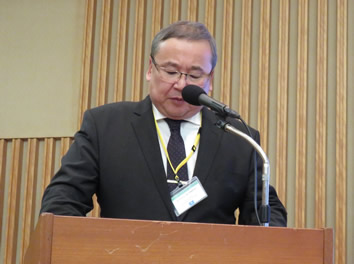Meeting Summary of the 16th FNCA Ministerial Meeting
The 16th FNCA Ministerial Level Meeting (MM), which was organized by Japan Atomic Energy Commission (JAEC) and the Cabinet Office of Japan (CAO), was held at Mita Conference Hall, Tokyo on December 8, 2015.
The meeting was attended by ministerial level representatives (including two ministers, two vice ministers, directors of the nuclear administrative agencies) from eleven member countries (China was absent) and Director General of the OECD Nuclear Energy Agency (NEA). In association with the United Nations Summit and the United Nations Framework Convention on Climate Change, the Conference of Parties of United Nations Conventions No. 21 (COP21) held this year, discussions took place under the theme of "Climatic Changes and Role of Nuclear Energy" to explore FNCA's contributions to counter the climate change. Reforms for further developments of FNCA were also discussed. Discussion results were adopted as a joint communique.
(Program)(Participants List)
(1) Welcome address
Minister of State for Science and Technology Policy Aiko Shimajiri delivered the welcome address. In that, while recognizing FNCA's contribution to the socio-economic development of all member countries through the result of activities over 15 years since its foundation, Minister Ms. Simajiri emphasized the importance of cooperation in the field of nuclear safety in Asia, where the growth of electricity demand has been remarkable.

Minister of State for Science and Technology Policy Aiko Shimajiri |
(2) Keynote speech
OECD/NEA Director General Mr Magwood delivered the keynote speech "Cooperation with OECD/NEA and Development". He explained the importance of nuclear energy as a measure to ease climate changes and suggested various support measures that OECD/NEA could offer to FNCA to promote the infrastructure development of atomic energy.(OECD/NEA Presentation(PDF))

OECD/NEA Director General Mr Magwood |

A Scene of the Meeting |
(3) Country report
Representatives from all countries presented the energy policy including nuclear energy and the results from the research on the use of radiation.
(4) Roundtable discussion
Based on the theme of "Climate Changes and Role of Nuclear Energy", contributory measures to ease and adapt to climate changes using nuclear energy technology were discussed and an action plans in three fields (climate science, mitigation measure and adaptation measure) were adopted.
Reform of the FNCA framework was also discussed to suite FNCA activities to the needs of each participating country where economic development is remarkable. Discussion results were adopted in the joint communique.
(5) Closing address
State Minister of Cabinet Office Mr Matsumoto suggested holding an FNCA Ministerial Level Meeting in 2016 in Japan and obtained the consent of participating countries. Furthermore, an FNCA Ministerial Level Meeting to be held in 2017 in Kazakhstan was suggested, and the consent of participating countries was obtained. At the end of the meeting, State Minister of Cabinet Office Mr Matsumoto delivered a closing address and expressed his gratitude for the successful completion of the meeting, owing to the presence of all participating countries.

State Minister of Cabinet Office Mr Matsumoto
|

National Nuclear Center (NNC)
Director General Dr Batyrbekov, Kazakhstan
|
(6)Summary of the joint communique:
| ・ |
Starting a new project on the science of climate changes that uses nuclear energy science and technology in 2017. |
| ・ |
Further promoting a radiation breeding project that can contribute as an FNCA nuclear energy adaptation project, e.g., a climate change adaptation plan for sustainable development. |
| ・ |
Strengthening of domestic frameworks for the compensation of nuclear damage, taking into account allied activity and international agreement conformity to build trust toward atomic energy technology, promoting communication between the interested parties and the general public. |
| ・ |
Promoting cooperation with international organizations such as IAEA and OECD/NEA for mutual benefits by reinforcing the main role of FNCA and cooperation. |
| ・ |
Because FNCA immediately meets the needs of participating nations, improve how FNCA activities are conducted to enhance the efficiency and efficacy of FNCA affairs. |
| ・ |
Promoting the diversification of financial resources for activities and further utilization of the result of projects/themes. |
|
